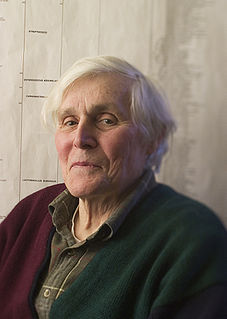A Quote by Beeban Kidron
The thing that upsets me is the ubiquitous use of reward technology, which uses our evolutionary biology against us.
Quote Topics
Related Quotes
Considering that we live in an era of evolutionary everything---evolutionary biology, evolutionary medicine, evolutionary ecology, evolutionary psychology, evolutionary economics, evolutionary computing---it was surprising how rarely people thought in evolutionary terms. It was a human blind spot. We look at the world around us as a snapshot when it was really a movie, constantly changing.
What I’m trying to show is that the main event today is not seen by those of us that are living it… So it’s not the effect of [technology], it is that everything exists with-in [its milieu]. It's not that we use technology, we live technology. Technology has become as ubiquitous as the air we breathe, so we are no longer conscious of its presence.
We must ask whether our machine technology makes us proof against all those destructive forces which plagued Roman society and ultimately wrecked Roman civilization. Our reliance - an almost religious reliance - upon the power of science and technology to forever ensure the progress of our society, might blind us to some very real problems which cannot be solved by science and technology.
Embedded in every technology there is a powerful idea, sometimes two or three powerful ideas. Like language itself, a technology predisposes us to favor and value certain perspectives and accomplishments and to subordinate others. Every technology has a philosophy, which is given expression in how the technology makes people use their minds, in how it codifies the world, in which of our senses it amplifies, in which of our emotional and intellectual tendencies it disregards.
If belief in evolution is a requirement to be a real scientist, it’s interesting to consider a quote from Dr. Marc Kirschner, founding chair of the Department of Systems Biology at Harvard Medical School:
“In fact, over the last 100 years, almost all of biology has proceeded independent of evolution, except evolutionary biology itself. Molecular biology, biochemistry, physiology, have not taken evolution into account at all.
I think it's fair to say there is a demagogic path that Europeans, South Americans, Asians have pursued, and we know where that leads. It uses xenophobia, it uses paranoia, it uses prejudice, it uses nationalism to really stir people up and to, you know, begin an us-versus-them contrast, which is dangerous and is not something we've had in our politics at a presidential level in America.





































